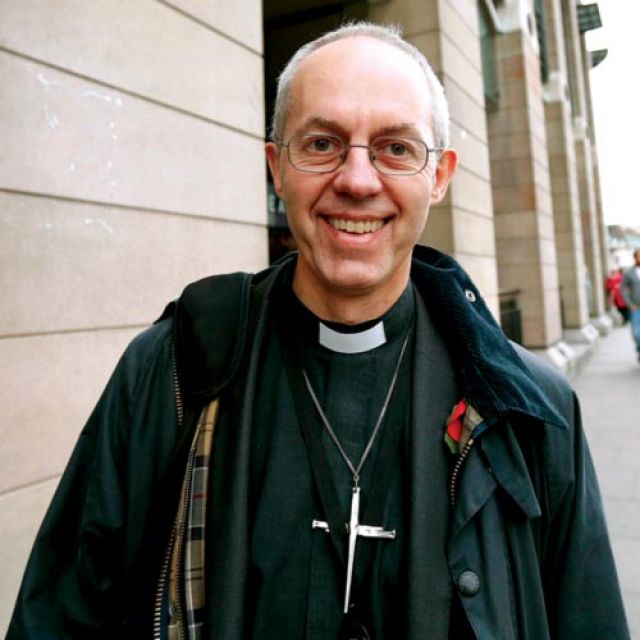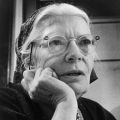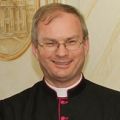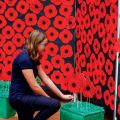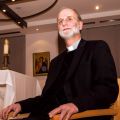NEWS
MANCHESTER, ENGLAND - The newly appointed leader of the world’s Anglicans is a former oil executive who said his spiritual director was a Catholic monk.
Bishop Justin Welby of Durham, who will become the new archbishop of Canterbury, did not name the monk, but told a Nov. 9 news conference at London’s Lambeth Palace that he was influenced by both Benedictine and Ignatian spirituality. He also told reporters that he would be voting in favour of the ordination of women as bishops when the General Synod will decide the matter at a two-day meeting beginning Nov. 19.
Welby’s appointment as the primate of England and the leader of the worldwide Anglican Communion was announced Nov. 9 following selection by the Crown Nominations Commission and approval of Queen Elizabeth II, the supreme governor of the Church of England. The 56-year-old will be enthroned as the 105th archbishop of Canterbury in Canterbury Cathedral March 21 in succession to Archbishop Rowan Williams, who leaves the post in December.
Welby has been described as an Anglican evangelical with sympathy for the Catholic tradition. A Nov. 9 press release by the Church of England said he has “frequently said that the Roman Catholic approach to Christian social teaching, beginning with the encyclical of Leo XIII’s Rerum Novarum, up to Pope Benedict XVI’s Caritas Veritate, has greatly influenced his social thinking.”
Welby told the Lambeth press conference he knew the Church of England was “facing very hard issues.”
“In 10 days or so the General Synod will vote on the ordination of women as bishops, and I will be voting in favour and join my voice in urging the synod to go forward with this change,” he said.
The archbishop-designate also noted that the Anglican Communion was divided over issues of sexuality but said that it would be wrong to tolerate “any form of homophobia in any part of the church.”
Visiting elderly, pope says 'it's wonderful being old'
By Cindy Wooden, Catholic News ServiceROME - Presenting himself as "an elderly man visiting his peers," Pope Benedict XVI visited a Rome residence for the elderly, urging the residents to see their age as a sign of God's blessing and urging society to value their presence and wisdom.
"Though I know the difficulties that come with being our age, I want to say, it's wonderful being old," the 85-year-old pope said Nov. 12 during a morning visit to the residence run by the lay Community of Sant'Egidio.
The residence includes apartments for independent living as well as rooms for those requiring more skilled care. Younger members of the Sant'Egidio Community volunteer their time assisting and visiting with the residents, who include an elderly couple from Haiti whose home was destroyed in the 2010 earthquake.
Walking with his white-handled black cane, the pope visited several of the residents in their rooms and apartments before addressing them and members of Sant'Egidio in the garden.
One of the residents, 91-year-old Enrichetta Vitali, told the pope, "I don't eat so much anymore, but prayer is my nourishment." She asked the pope to "pray that I don't lose my memory so I can keep remembering people in my prayers."
The pope told those gathered at the residence on the Janiculum Hill that in the Bible a long life is considered a blessing from God, but often today society, which is "dominated by the logic of efficiency and profit, doesn't welcome it as such."
"I think we need a greater commitment, beginning with families and public institutions, to ensure the elderly can stay in their homes" and that they can pass on their wisdom to younger generations.
"The quality of a society or civilization can be judged by how it treats the elderly," he said.
Pope Benedict also insisted on recognition of the dignity and value of all human life, even when "it becomes fragile in the years of old age."
"One who makes room for the elderly, makes room for life," the pope said. "One who welcomes the elderly, welcomes life."
The pope told the residents that he knows the aged face difficulties, especially in countries where the global economic crisis has hit hard. And, he said, the elderly can be tempted to long for the past when they had more energy and were full of plans for the future.
However, the pope said, "life is wonderful even at our age, despite the aches and pains and some limitations," he said.
"At our age, we often have the experience of needing other's help, and this happens to the pope as well," he told the residents.
Pope Benedict said they need to see the help they require as a gift of God, "because it is a grace to be supported and accompanied and to feel the affection of others."
World needs better tracking, disposal of weapons, Vatican official says
By Greg Watry, Catholic News ServiceVATICAN CITY - The international community must get serious about enforcing humanitarian laws that make it possible to secure or destroy explosive devices leftover from a war before those devices harm innocent civilians or fall into the hands of terrorists, a Vatican official said.
Archbishop Silvano M. Tomasi, the Vatican's representative to U.N. agencies in Geneva, addressed a U.N. conference reviewing compliance with an international agreement on the restriction and use of certain conventional weapons; the conference was held in Geneva Nov. 12-13.
The focus of the conference was on laws dealing with the tracking and disposal of "explosive remnants of war," such as landmines and roadside bombs.
Failure to implement the agreement, Archbishop Tomasi said, has meant that many explosive weapons are not monitored during a conflict or removed after a conflict ends. As a result, they fall into the hands of terrorist groups and criminal organizations, and pose a threat to innocent civilians, he said.
Any hesitation in documenting or removing the explosive remnants of war, the archbishop said, "means more victims and bigger economic and social costs, and long-term hampering of development."
In past and present conflicts, civilians' safety has not been a priority, and "international humanitarian law was merely a set of non-respected rules," he said.
Archbishop Tomasi called for full adherence to the international agreements and international cooperation in monitoring compliance. "This is the only way to protect the civilian population, and in some cases the national community as a whole, from the consequences of explosive remnants of war."
The international community has a moral responsibility to protect civilians from explosive weapons during and after conflicts, the archbishop said. "Civilians should not have to pay twice for the absence of a secure, free and peaceful environment."
Comboni nun works to help Eritreans tortured, raped en route to Israel
By Judith Sudilovsky, Catholic News ServiceTEL AVIV, Israel (CNS) -- Comboni Sister Azezet Kidane is fluent in Amharic, Tigrit, Arabic and Sudanese dialects, so she was a natural choice when a shelter for African refugees needed help.
It was only after the nun, known as Sister Aziza, began conducting interviews with Eritrean refugees that she realized the people she was talking to had been tortured.
"It is a horror story what is happening," she told Catholic News Service from the African Refugee Development Center's shelter for single mothers and pregnant women in a low-income neighborhood of Tel Aviv.
Shahar Shoham, director of migrants and statusless people at Physicians for Human Rights Israel, said the first clue that something was happening in the Sinai Peninsula was the condition in which refugees arrived at their clinic in Tel Aviv.
"They told us of torture and rape and we saw the scars of their torture. People who were shot by the Egyptian forces at the border started coming to our clinic," said Shoham.
"Sister Aziza is a blessing for us. People feel comfortable opening up to her," she said. "The torture continues even now. As we are speaking it is happening."
In two-and-a-half years, Sister Aziza has taken testimony from some 1,500 refugees. As the Eritrean nun taps on the doors of the rooms, women greet her with hugs and kisses; a young girl runs after her to clutch her hand as they walk down the street together.
"I can't say all of the people I've interviewed have been kidnapped and tortured, but most of them have been," she said as she sat underneath the shade of tree in a dusty lot next to the women's shelter. "Sometimes (the victims) can't even (recount) what happened to them and when you know (what happened) you can't repeat it, it is shameful that a human being could do such a thing."
Many of the women who arrive at the shelter are pregnant from rape.
Eritreans leave their country to escape poverty and forced military service for the authoritarian regime.
In October, a delegation from the U.S. Catholic Conference of Bishops' Committee on Migration visited Egypt and reported that Eritrean refugees were being apprehended by Sudanese enforcement authorities while en route to Egypt. The authorities turn the refugees over to members of the Rashaida tribal clan, who sell them to Bedouin tribesman in Egypt's Sinai Peninsula.
A statement by Kevin Appleby, director of migration policy for the USCCB, said some 700 refugees were in captivity in the Sinai in mid-October. The refugees are subject to systematic rape and torture, he said.
Egyptian and Israeli authorities are aware of the kidnapping rings but still the practice continues, he said. He urged the U.S. government to work with Egypt to identify the "torture houses," rescue the refugees and consider them for "expedited resettlement." He also said the U.S. should also encourage Israel to "uphold its responsibility as a signatory of the 1951 refugee convention and halt the practice of denying entry to refugees and deporting them to dangerous situations."
Physicians for Human Rights Israel reports that some 7,000 of Eritrean refugees have been held for ransom and tortured and raped at the hands of their Bedouin kidnappers. Another 4,000 people have died en route to Israel, either as a result of being smuggled, tortured, or shot by the Egyptian soldiers following a shoot-to-kill policy, the agency said.
Israel is building a fence along its 150-mile southern border, cutting off the refugees' escape from the Sinai into Israel. In March, Israel began building a new detention center in the south of the country; initially, the center will hold 8,000 people.
At the Tel Aviv shelter, two Eritrean women -- one visibly pregnant -- sit at a metal tray set with coffee cups and grinder in front of the open door of their sparsely furnished room. A blue-and-green checked kitchen towel protects the last of their traditional round ambasha sweet bread from flies.
The women offer visiting journalists a slice of ambasha, but they decline to be interviewed or photographed.
The refugees are tired of journalists and being interviewed, Sister Aziza said. They see no concrete results from all the interviews they have given.
"How many journalists, how many videos have been done but the world is silent," said Sister Aziza, who was named a 2012 Trafficking in Persons Report Hero by the U.S. State Department for her work exposing the situation. "Nothing changes, nothing gets better for them. It is only getting worse. They are disappointed with all the efforts."
Through Caritas Italy funding the Comboni sisters have helped the women open a nursery for the young babies at the shelter so the mothers can work. In a separate basket-weaving workshop, women use their traditional skills to create colorful cloth baskets they sell.
Sister Aziza's phone number, which is passed around by word of mouth, is available 24 hours a day to refugees, human rights workers, diplomats and Israeli government agencies. The Israeli Prison Authority often contacts her for advice about underage refugees.
The work of listening to the refugees' stories is difficult, she said, and all she can do is be there for them to listen and then listen some more. Just a few days earlier she had gone on a 10-day retreat with a silent order near Jerusalem in order to gather her strength together to continue the work she said.
"Without prayer, I could not do this work," she said. "I want people of the world to break the silence, but only God will be able to change the hearts of the people."
US bishops endorse sainthood cause of Catholic Worker's Dorothy Day
By Mark Pattison, Catholic News ServiceBALTIMORE - The U.S. bishops, on a voice vote, endorsed the sainthood cause of Dorothy Day, the co-founder of the Catholic Worker movement, who was famously quoted as saying, "Don't call me a saint. I don't want to be dismissed so easily."
The endorsement came at the end of a canonically required consultation that took place Nov. 13, the second day of the bishops' annual fall general assembly in Baltimore.
Under the terms of the 2007 Vatican document "Sanctorum Mater," the diocesan bishop promoting a sainthood cause must consult at least with the regional bishops' conference on the advisability of pursuing the cause.
In the case of Day, whose Catholic Worker ministry was based in New York City, the bishop promoting her cause is Cardinal Timothy M. Dolan of New York, president of the U.S. bishops' conference. The cause was first undertaken by one of Cardinal Dolan's predecessors in New York, Cardinal John O'Connor.
Cardinal Dolan had earlier conducted a consultation with bishops in his region, and subsequently chose to seek a consultation with the full body of U.S. bishops.
He and the other bishops who spoke during the consultation, some of whom had met Day, called her sainthood cause an opportune moment in the life of the U.S. church.
Cardinal Dolan called Day's journey "Augustinian," saying that "she was the first to admit it: sexual immorality, there was a religious search, there was a pregnancy out of wedlock, and an abortion. Like Saul on the way to Damascus, she was radically changed" and has become "a saint for our time."
"Of all the people we need to reach out to, all the people that are hard to get at, the street people, the ones who are on drugs, the ones who have had abortions, she was one of them," Cardinal Theodore E. McCarrick said of Day. The retired archbishop of Washington is a native New Yorker.
"What a tremendous opportunity to say to them you can not only be brought back into society, you can not only be brought back into the church, you can be a saint!" he added.
"She was a very great personal friend to me when I was a young priest," said Bishop William F. Murphy of Rockville Centre, N.Y. "To be able to stand here and say yes to this means a great deal to me."
Bishop Alvaro Corrada del Rio of Mayaguez, Puerto Rico, recalled being assigned to Nativity Parish in New York City in the 1970s. "I had the privilege of being in that parish for the last years of her life. ... her final days and suffering" and her 1980 funeral.
The work of the Catholic Worker movement is still active 80 years after Day co-founded the movement with Peter Maurin.
There are many Catholic Worker houses in the United States, some in rural areas but more in some of the most desperately poor areas of the nation's biggest cities. They follow the Catholic Worker movement's charism of voluntary poverty, the works of mercy, and working for peace and justice.
The Catholic Worker, the newspaper established by Day, is still published regularly, and still charges what it did at its founding: one penny.
"I read the Catholic Worker when I was in high school and I've read it ever since," said Cardinal Francis E. George of Chicago. He recalled meeting Day soon after the 1960 presidential election.
"I had just voted for the first time, for John F. Kennedy. I listened to her critique of our economic and political structures. I asked her, 'Do you think it will help having a Catholic in the White House who can fight for social justice?'
"She was very acerbic. She said, 'Young man' -- I was young at that time -- 'young man, I believe Mr. Kennedy has chosen very badly. No serious Catholic would want to be president of the United States.' I didn't agree with her at that time. And I'm not sure I agree with her now."
Day's early life was turbulent and unsettled. She was born in Brooklyn, N.Y., in 1897, but her family soon moved to San Francisco, where she was baptized an Episcopalian. Her family later moved to Chicago, and Day attended the University of Illinois in Urbana.
However, she left college to go to New York City to work as a journalist. While in New York, she got involved in the causes of her day, such as women's suffrage and peace, and was part of a circle of top literary and artistic figures of the era.
In Day's personal life, though, she went through a string of love affairs, a failed marriage, a suicide attempt and an abortion.
But with the birth of her daughter, Tamar, in 1926, Day embraced Catholicism. She had Tamar baptized Catholic, which ended her common-law marriage and brought dismay to her friends.
As she sought to fuse her life and her faith, she wrote for such Catholic publications as America and Commonweal. In 1932, she met Maurin, a French immigrant and former Christian Brother. Together they started the Catholic Worker newspaper -- and later, several houses of hospitality and farm communities in the United States and elsewhere.
While working for integration, Day was shot at. She prayed and fasted for peace at the Second Vatican Council. She died in 1980 in Maryhouse, one of the Catholic Worker houses she established in New York City.
She has been the focus of a number of biographies. Other books featuring her prayers and writings have been published. In the 1990s, a film biography "Entertaining Angels: The Dorothy Day Story" starring Moira Kelly and Martin Sheen, made its way to theaters.
New bishop named for Timmins diocese
By Catholic Register StaffMsgr. Serge Poitras, P.H., has been named the new bishop of Timmins in Northern Ontario.
Pope Benedict XVI made the announcement Nov. 10. At the time of his appointment, Bishop-elect Poitras was Adjunct Under Secretary of the Congregation for Bishops at the Holy See. He succeeds Bishop Paul Marchand, who died in office in 2011. Since then, Fr. Patrick Lafleur has been diocesan administrator.
Poitras was born on May 27, 1949, in Jonquière, Que. After studies in Chicoutimi and Quebec City, he was ordained to the priesthood on May 27, 1973, for the diocese of Chicoutimi. He holds a Master’s degree in theology from Laval University and a doctorate in theology from the Pontifical Gregorian University, Rome.
During his ministry as a priest, Poitras served the Cathedral parish of Chicoutimi as assistant pastor, the Chicoutimi minor seminary as a professor, and the diocesan centre where he was responsible for pastoral ministry with students. From 1990 to 2000, he taught at the Grand Séminaire of Montreal, where he was a member of the formation team, as well as director of studies from 1998 to 2000. During this time, he also provided pastoral assistance in a number of Montreal parishes.
In 2000, he was appointed French-language secretary at the apostolic nunciature to Canada. The Holy Father subsequently named him Adjunct Under Secretary of the Congregation for Bishops on Dec. 29, 2010.
The Timmins diocese has 26 parishes and missions, with a Catholic population of 50,605, which is served by 18 diocesan priests, four priests who are members of religious communities, 17 religious Sisters and Brothers, six permanent deacons and five lay pastoral assistants.
Aid groups gather in Beirut to discuss Syrian refugee crisis
By Doreen Abi Raad, Catholic News ServiceBEIRUT - Representatives of 26 humanitarian agencies gathered in Beirut to discuss and coordinate efforts to address the increasing Syrian refugee crisis.
Cardinal Robert Sarah, president of the Pontifical Council Cor Unum, who visited with Syrian refugees in the Bekaa Valley, presided over the Nov. 9 meeting.
During the cardinal's Nov. 6-10 visit, he also met with Lebanese President Michel Sleiman and participated in the monthly meeting of the council of Maronite Catholic bishops in Bkerke.
At the meeting sponsored by Caritas, the church's charitable agency, the humanitarian organizations agreed to carry out social work for the vulnerable populations inside and outside of Syria, to help alleviate their suffering, including providing medical and spiritual assistance as well as helping them to find shelter and prepare for the winter.
The groups also agreed to institute an efficient coordination system among the Catholic humanitarian organizations to unify their approach on the field.
They also stressed the importance of efforts to allow refugee children to continue their education and to recover some kind of routine in their daily lives.
Pope Benedict XVI had hoped to send a delegation of three cardinals, three bishops and a priest to Syria during the world Synod of Bishops, which met for three weeks at the Vatican in October, to show solidarity with victims and encourage peace negotiations. The papal delegation to Damascus was to have included Cardinal Timothy M. Dolan of New York, chairman of the board of the Catholic Near East Welfare Association.
Pope Benedict announced Nov. 7 that he would send Cardinal Sarah to Lebanon to deliver a $1 million donation and boost the church's humanitarian response to the crisis.
Syria's civil war has left thousands dead and has displaced hundreds of thousands of people since March 2011.
The U.N. refugee agency said Nov. 9 that a record number of Syrian refuges had crossed into Turkey, Lebanon and Jordan, setting a record for a 24-hour period.
The majority -- reportedly 9,000 Syrians -- had crossed into Turkey's Urfa province during the night Nov. 8, said the U.N. High Commissioner for Refugees.
The remaining 2,000 Syrians were registered and assisted by UNHCR in Jordan and Lebanon, the agency said.
Those arrivals bring the number of Syrian refugees in the region to 408,000, the UNHCR said, but the numbers are actually greater because not all of the displaced Syrians entering the countries are registering with the agency.
It said about 115,000 Syrian refugees live in Lebanon. It said approximately 1,000 entering the country daily, including migrant workers who go back and forth between Lebanon and Syria.
Vatican court finds computer tech guilty of aiding, abetting butler
By Cindy Wooden, Catholic News ServiceVATICAN CITY (CNS) -- A Vatican court found Claudio Sciarpelletti, a computer expert in the Secretariat of State, guilty of aiding and abetting the papal butler, who was convicted of stealing sensitive Vatican correspondence.
The three-judge panel hearing the case Nov. 10 initially sentenced Sciarpelletti to four months in jail but reduced the sentence to two months, saying Sciarpelletti had never been in trouble with the law and previously had served the Vatican well.
The judges suspended even the two-month sentence and said that if, over the next five years he commits no other crimes, the penalty would be lifted.
The Vatican court indicted Sciarpelletti in August, accusing him of helping Paolo Gabriele, the papal butler, by obstructing the Vatican investigation of the butler's role in stealing, photocopying and leaking private Vatican correspondence to an Italian journalist. The butler is serving an 18-month sentence in a cell in the Vatican police barracks.
After an unnamed source told Vatican investigators in late May that Sciarpelletti and Gabriele were in frequent contact, Vatican police searched Sciarpelletti's office in the Secretariat of State. The police said they found an envelope marked "Personal: P. Gabriele."
The court did not reveal details about the envelope's contents other than mentioning assorted emails signed "Nuvola" (cloud in Italian), a small section of a book written by the Italian journalist who received leaked documents from Gabriele and pages of articles downloaded from the Internet.
Sciarpelletti was arrested in late May and held in a Vatican cell for one night, after which he was released on a bail of 1,000 euros (about $1,270). In its sentence Nov. 10, the court said it would return the bail to Sciarpelletti, but it also ordered him to pay the court costs, which are about the same amount, said Jesuit Father Federico Lombardi, Vatican spokesman.
The Vatican prosecutor accused Sciarpelletti of obstructing the Gabriele investigation by giving different versions of how he obtained the envelope and by changing his descriptions of his relationship with Gabriele.
The court session Nov. 10 began with the testimony of Sciarpelletti. Giuseppe Dalla Torre, president of the three-judge panel, asked the defendant why he changed his story in the month after his arrest.
Sciarpelletti said his arrest was "traumatic," which, combined with the fact that he received the envelope years ago, made it difficult to remember exactly how he came to have it in his desk. He said he did not know what was in the envelope since he never opened it because it was marked "personal."
The computer tech first told investigators that he received the envelope from Gabriele; then he said he received it from his superior, Msgr. Carlo Maria Polvani, head of the Vatican Secretariat of State's office for information and documentation.
Saying, "I swear on my baptism and my priesthood," Msgr. Polvani told the court Nov. 10 that he had never violated the secret of his office and had never improperly removed, copied or shared any confidential Vatican documents. He denied giving Sciarpelletti the envelope.
Msgr. Polvani, the 47-year-old nephew of Archbishop Carlo Maria Vigano, the nuncio to the United States, said he only met Gabriele when the butler came to visit Sciarpelletti in their office, something Msgr. Polvani said he thought happened often. "I think they were good friends," he said.
Gabriele, who also testified Nov. 10, told the court that Sciarpelletti "was a friend and I confided in him," including about "worrying things that were happening in the Vatican." The butler said he gave Sciarpelletti the papers, seeking his opinion about them. But Gabriele said, as far as he remembers, he gave Sciarpelletti the papers on various occasions, so Sciarpelletti must have put the papers in the envelope himself.
Father Lombardi told reporters that Vatican investigators had not closed their files on the "VatiLeaks" scandal; further investigations and even indictments are possible, he said.
The court session Nov. 10 was not without its lighter moments: the court reporter's computer stopped working at a certain point. Sciarpelletti asked, "Do you need a technician?" and everyone in the courtroom burst out laughing. Gianluca Gauzzi Broccoletti, the Vatican police officer who was testifying, got up and discovered that the electrical outlet being used was no longer working. An extension cord was plugged into a different outlet and the testimony resumed.
Veterans help students understand why we remember
By Evan Boudreau, The Catholic RegisterTORONTO - Gerry O'Pray served his country in the armed forces for eight years and now he wants young people to understand why.
"We have to stand up for our values that citizens have fought and died for," said O'Pray. "Remembrance is good but maintaining and living our values is the best way to honour those who've served."
O'Pray was speaking to 55 Grade 8 students from St. Gabriel Catholic School on Nov. 6s. The students placed paper poppies inscribed with personalized messages at a memorial set up at the Catholic Education Centre.
"Thank you for fighting for our peace and our lives," said one note.
"May your neighbours respect you, trouble neglect you, angels protect you and heaven accept you," said another.
"Because of our soldiers I may stand tall and free, not having to worry about a gun and having to flee," said a third.
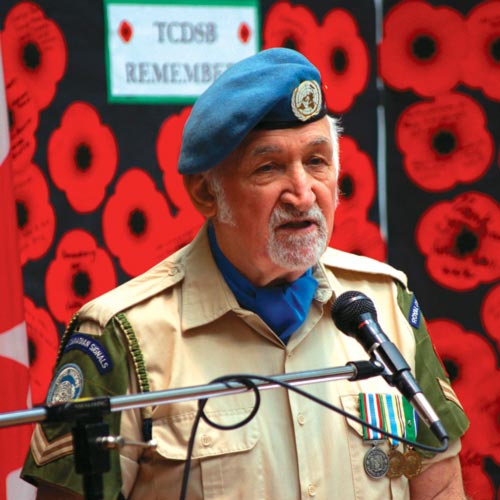
Gerry O'Pray speaks to 55 Grade 8 students about why he served.
- Photo by Evan Boudreau
O'Pray, who turns 71 this Remembrance Day, joined the Canadian Forces in 1959 at 18 after graduating high school in Truro, Nova Scotia. Two years later he was in the Congo serving in a peacekeeping role with the United Nations — a mission that saw 256 peacekeeping soldier casualties, including two Canadians.
"When I was on the Congo mission, there were 37 countries as part of that mission," he said. "It was then that I realized how much I appreciated my country. The Congo mission ended in 1964 (and) unfortunately we left a really brutal dictator in charge."
Following that two-year tour, O'Pray returned home until deploying to Egypt for a year. He ended his eight years of service safely in Canada and transitioned back into civilian life. But he's never forgotten why he served.
Remembrance Day fell on a Sunday this year, outside of school hours, but the Toronto Catholic District School Board (TCDSB) was intent on remembering the men and women who've served the nation. That long list includes one of the board's own, Second Lieutenant Christian Cieplik, a graduate of the Toronto Catholic school system.
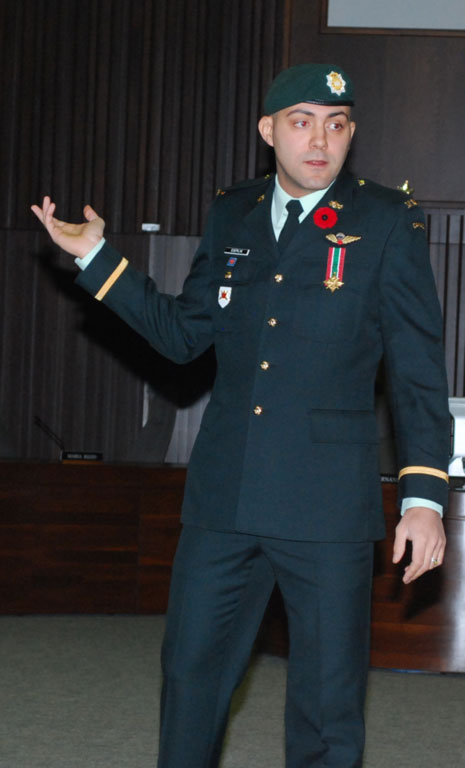
Second Lieutenant Christian Cieplik tells students on from St. Edward Catholic School about his 2010 tour in Kandahar, Afghanistan on Nov. 8.
- Photo courtesy of the Toronto Catholic District School Board.
Cieplik was one of three veterans invited to speak to students at the Catholic Education Centre during the week. Two years ago, while a member of the 3rd Battalion Royal Canadian Regiment, he received about 800 letters from students of his alma mater, Our Lady of Victory Catholic School, while deployed in Kandahar, Afghanistan.
"That was a huge gesture on their behalf and it was really cool because, depending on the age group, they tell you everything about themselves," said Cieplik.
Participating in Remembrance Day services is more than a tribute to those who've risked their lives for our freedoms, said Bruce Rodrigues, the board's director of education. It's also an expression of Canada's commitment to transforming the world.
"Because Remembrance Day falls on a non-school day this year, we wanted to ensure that we took the time within our school communities to reinforce its importance," said Rodrigues. "That importance would be to honour all of those who have sacrificed for peace and those who continue to serve our country."
Cieplik credits his time in Catholic school for preparing him for his stint in Afghanistan. He said it instilled him with a sense of service, respect and sacrifice.
"Being able to connect with people of different backgrounds and beliefs, that helped a lot over there," he said. "Especially dealing with locals and our interpreters. The Afghan National Army, they're all Muslim or Shiite, but I was still able to respect that faith and it was reciprocated. That helped a lot."
Cieplik, who joined the Canadian Forces in 2006 after graduating from York University where he studied political science, wants to give back to the school board. He began last school year with a speaking engagement at Our Lady of Victory, where students gave him a hero's welcome.
"Last year when I went to my old elementary school they were cheering, the kids were cheering, they went nuts," he said.
"The area I grew up in has grown more violent over the years in Toronto and you're just kind of showing that there is another option, that violence doesn't have to rule or dictate how you turn out or it shouldn't really affect your morals and ethics in a negative way."
Cieplik connected so well with the children that the board asked him to speak this year at the Catholic Education Centre during Veterans' Week. Before his address to more than 50 students from St. Edward Catholic School, the 31 year-old soldier said he'd stress that all war did not end in 1945, rather, a type of war ended.
"Everything has been engrained in their minds that it's poppies and white crosses, like older forms of wars in Europe," he said.
Rodrigues reiterated this.
"It's not about the past. It's about the present and about ensuring the future," he said.
Remembrance Day is as much about a moment of silence as it about learning from the voices of the past, Rodrigues said.
"Having someone who's had the experience puts a real face on the event," he said. "The veteran will often do that with students so they can understand here is a real human face that has lived this experience and is not telling it from a story perspective but rather a real life experience."
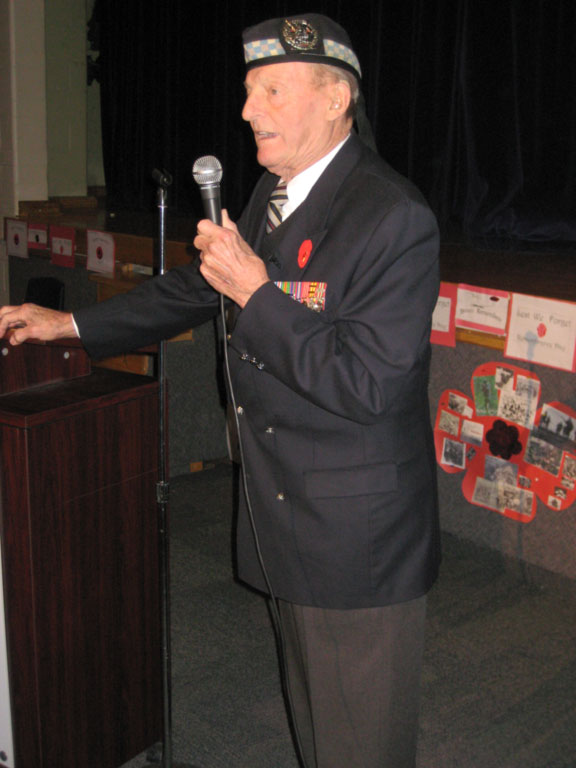
Word War II veteran Stan Egerton, who reached the rank company sergeant major, speaks to an auditorium full of students at Don Bosco Catholic Secondary School on Nov. 7.
- Photo courtesy of Tim Stewart
Veterans visited several schools during Veterans' Week. Second World War veteran Stan Egerton was at Don Bosco Catholic Secondary School and told students how, like many surviving WWII veterans, he lied about his age to join the service.
Egerton served under his brother George, a sergeant, for about two years in Europe before an artillery shell claimed his brother's life on Sept. 4, 1944. About a month earlier Egerton's other brother Frank, a private, was also killed in action, leaving him the family's sole surviving, son.
Often Remembrance Day services focus on the dead, the fighting and the destruction. But the TCDSB wanted a diverse range of veterans to teach students that there is more than one way to solve a conflict and fighting is always the last resort.
"Youth need to understand that there are other ways to solve conflict," Rodrigues said. "Today we wouldn't necessarily resolve conflict through fighting but through collaboration and that sense of coming together to find a common solution that can be attained through conversation."
Out of the Holodomor rises a stronger Church
By Michael Swan, The Catholic RegisterFew Ukrainians are thankful for Josef Stalin. In 1932-33 the Soviet dictator starved about six million Ukrainians to death in a planned genocidal famine known as the Holodomor.
But the new bishop for Ukrainian Catholics in France, Switzerland, Luxembourg, Belgium and the Netherlands has one good thing to say about Uncle Joe.
“Stalin aided the future missions by deporting people to Siberia, to Kazakhstan, to different corners of the vast expanse of the Soviet Union. There now, through descendants of the political prisoners and deportees, the Greek Catholic Church is slowly developing its mission — which of course is open to all people of good will who might be attracted to the Church,”
Bishop Borys Gudziak said as he passed through Toronto on a tour of Ukrainian communities in North America.
It’s a bit like thanking Satan for making Christ’s incarnation and resurrection necessary.
The Byzantine Rite Catholic Church in Ukraine survived three generations of often horrific martyrdom. For this Church to survive at all is one of the great accomplishments of the 20th century, said the Harvard-educated historian.
“Ukrainians are a post-traumatic people. They’ve had a toxic degree of trauma in the 20th century,” he said. “Seventeen million Ukrainians were killed in the 20th century.”
For three generations Ukraine was under occupation, kept in line by the highest concentration of KGB agents, informants and collaborators in the Soviet Union.
“People lived in fear,” said Gudziak. “Fear is never something that really opens people up. You sort of close in on yourself.”
But a closed-in, self-absorbed, defensive Church is not what the Syracuse, N.Y.-born son of immigrants has found in Ukraine. Within Ukraine, the Greek Catholics have become a beacon on a hill proclaiming openness and democracy, decrying corruption and authoritarianism. Particularly under Cardinal Lubomyr Husar, they have demanded a different future for their country.
“The Greek Catholic Church today is a Church of the martyrs. At the same time it’s a Church that’s favoured by intellectuals, young people, urbane businessmen and women who want Ukrainian society to change — rule of law to become the style of the country,” he said. “Since the Greek Catholic Church did not compromise with the regime, it emerged from the catacombs with incredible, relatively speaking, moral authority.”
As rector of the Ukrainian Catholic University in Lviv for the past 12 years, Gudziak has built this tiny university into a democratic island of free and open debate. Officers of the SBU, Ukraine’s security service, came visiting in 2010. They asked Gudziak to keep his students away from protesting a newly authoritarian government with ties to Moscow. Gudziak not only refused, he told everybody about the visit.
“The Church is actually quite free in Ukraine, limited only by its imagination. The Ukrainian Catholic University is itself witness to this,” said Ukrainian-Canadian Jesuit Father David Nazar in an e-mail to The Catholic Register.
Nazar describes Gudziak as a “high-end dreamer.” For Gudziak, being Christian means sharing those dreams. To follow a God who in Christ seeks the human means offering a fully human experience of God to the world without preconditions.
“Jesus really brings to us a call to a radical openness. It’s a going to the other,” he said. “My hope is that the radical deprivations Christians endured and in many ways still face in the former Soviet Union will be a place where the faith is forged.”
That martyrdom and oppression should be the forge for openness, charity, joy and hope is unexpected, and perhaps too much to ask. But over the past 25 years Gudziak’s Church has been witness to miracles.
“The intoxicating and exhilarating but often overwhelming change in society for the Church is now only in some ways settling, if you can say that any culture has settled in the first decades of the 21st century,” Gudziak said.
Gudziak will be enthroned as Apostolic Exarch at Notre Dame Cathedral in Paris Dec. 2.
Sault’s new school aims to preserve French culture
By Evan Boudreau, The Catholic RegisterFor the French Catholic community in Sault Ste. Marie, Ont., the newly constructed École Notre-Dame-du-Sault will provide students with the sense of belonging necessary for preserving their French identity.
“The community really wanted us to unite all of our students at one site and offer students a high quality school where they get to start off in Kindergarden and finish off in Grade 12,” said Paul de la Riva, spokesperson for the Conseil scolaire catholique du Nouvel-Ontario (CSCNO). “The board’s main goal is to keep our students from Kindergarden to Grade 12.”
But that isn’t what had been happening in northern Ontario’s third largest city. While there are two elementary schools — École Cardinal-Léger and École Notre-Dame-des-Écoles which was expanded to become the new school — it had been renting space at a local Catholic secondary school to house its own high school.
De la Riva said this lack of independent identity caused many students to move to the English boards, either public or Catholic, when they entered Grade 9.
“All our schools weren’t really up to par, they were old schools and they really weren’t meeting the needs of the community,” he said. “When you’re renting a spot or area in another school you may have your own wing but you’re always looking at what the others are doing, the bigger section of the school. By having our students in their own building it will build a sense of belonging.”
That’s what prompted the five-year, $12.5- million project of renovating, expanding and rebranding École Notre-Dame-des-Écoles for which the province put forward $11.26 million, with the additional funds coming from the board’s budget.
It isn’t just CSCNO students who will benefit from this new building, which held its official opening ceremony on Oct. 26. Along with housing the more than 300 students from Junior Kindergarden to Grade 12, the building will also host the French-language adult learning centre and the Centre francophone de Sault-Ste-Marie, as well as play a supportive role for many off site organizations.
It is hoped this will help establish the new school as a hub for francophone pride.
“The school’s community component is something we hold dear and which will certainly contribute to its growth and to the vitality of the francophone community in Sault Ste. Marie and the Algoma District,” said Lyse-Anne Papineau, CSCNO director of education, in a news release. “We strongly believe that the new school will become a key City of Sault Ste. Marie partner for many years to come.”
Not only does the board hope that more students will remain pupils of its system, the board also hopes to attract new students to the francophone system with the modern school which has a capacity of 565 students. To help ensure success in maxing out this expanded capacity, the school houses a French-language day care program for up to 30 children.
“It’s really important to support the parents in preserving their language,” said de la Riva. “If children are not going to French schools, we know that one generation from now you’re losing many francophones who may have knowledge of the language but will not have the skills or capacity to really speak the language, transmit the language and culture to their kids.”


